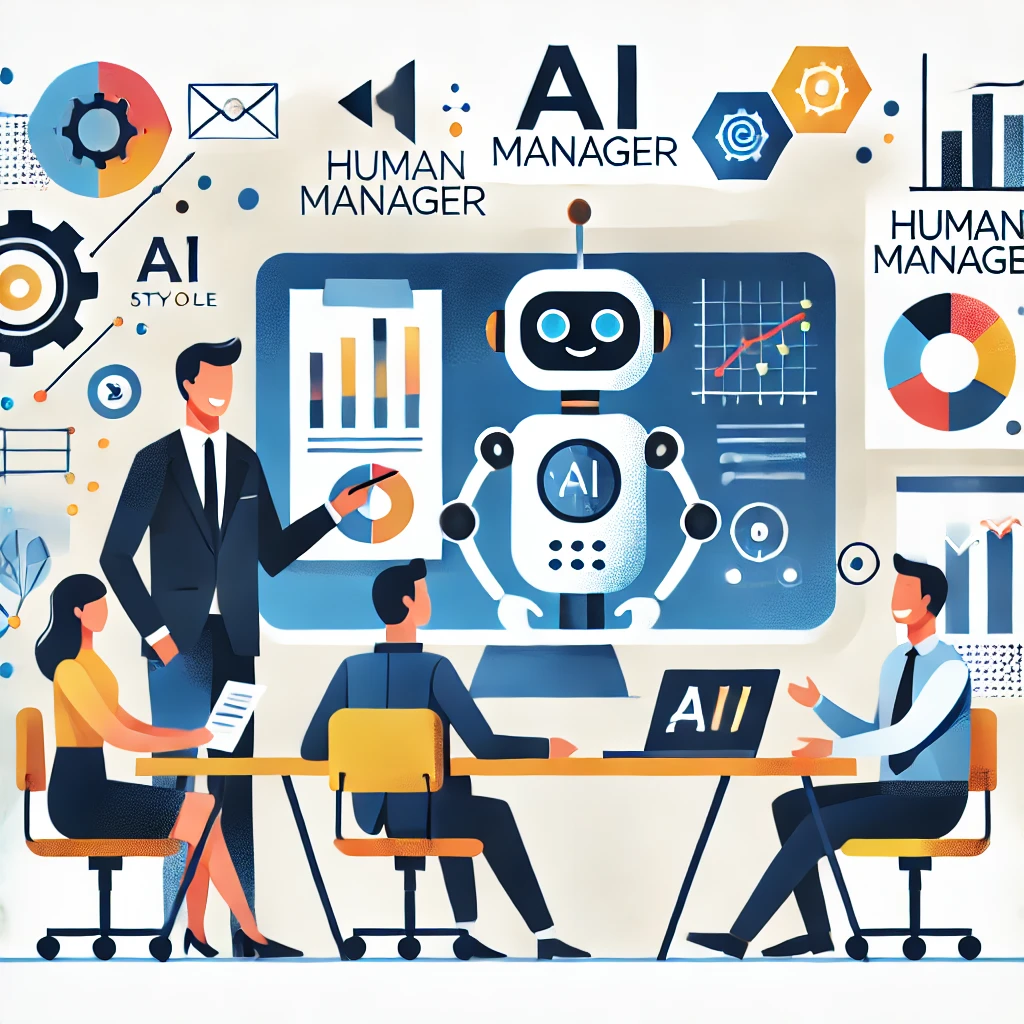The question of whether having an AI boss would be preferable to a human manager is gaining traction, especially in light of recent experiences shared by professionals like Hannu Rauma. Rauma, a senior manager at Student Marketing Agency in Vancouver, Canada, has found that implementing an AI manager has significantly alleviated his stress. Managing 83 employees had become overwhelming for him, leading to feelings of frustration and disappointment. However, since the introduction of an autonomous AI manager developed by Inspira, Rauma has experienced a notable shift in his work life, allowing him to concentrate on the growth of the company rather than being bogged down by daily management issues.
The AI manager has been designed to assist employees who work remotely and flexibly. It helps them organize their schedules, monitor their timekeeping, and send reminders about deadlines. Additionally, the AI offers suggestions for improving written communication and provides answers to work-related inquiries. This technological support has not only improved Rauma’s productivity but has also fostered better relationships with his employees. He notes that the dynamic has shifted from a hierarchical father-child relationship to a more equal and collaborative environment, enabling more positive and light-hearted interactions.
Despite the advantages observed by Rauma and some of his team members, not all employees at Student Marketing Agency have adopted the AI manager yet. A study conducted in collaboration with academics from various universities aimed to compare the effectiveness of AI management against traditional human management. The results indicated that while the AI manager achieved a success rate comparable to that of human managers in motivating employees to plan their workdays and log in on time, the combination of both AI and human management yielded even better results. This suggests that while AI can enhance productivity, the human element remains crucial in management.
However, experts caution against completely replacing human managers with AI. Professor Paul Thurman from Columbia University emphasizes the importance of middle management, which plays a vital role in providing continuity, mentoring, and coaching to employees. He argues that AI should be used to relieve managers of routine tasks, allowing them to focus on more strategic and innovative aspects of their roles. Furthermore, there is a risk that AI could be misused as a surveillance tool, which could create a culture of mistrust within the workplace. Companies must find a balance between leveraging AI for efficiency and maintaining a human-centric approach to management.
In addition to the ethical considerations, there are significant cybersecurity concerns associated with AI management. James Bore, a cybersecurity expert, warns that if companies rely heavily on AI managers, they risk exposing sensitive information and intellectual property to potential threats. The over-reliance on AI could lead to a lack of resilience, making it difficult for organizations to revert to human management if necessary. As businesses navigate the integration of AI into their operations, they must carefully weigh the benefits against the potential risks, ensuring that they do not compromise the well-being of their employees or the security of their data.
Original news source: Would having an AI boss be better than your current human one? (BBC)
🎧 Listen:
Slow
Normal
Fast
📖 Vocabulary:
| 1 | traction | The gaining of support or interest in a particular idea or concept |
| 2 | alleviated | Made less severe or burdensome |
| 3 | autonomous | Operating independently without human control |
| 4 | hierarchical | Arranged in order of rank or authority |
| 5 | collaborative | Involving mutual assistance and working together |
| 6 | effectiveness | The degree to which something is successful in producing a desired result |
| 7 | continuity | The state of being continuous or consistent over time |
| 8 | mentoring | The act of advising or training someone, especially a younger colleague |
| 9 | surveillance | Close observation, especially of a person or group |
| 10 | leveraging | Using something to maximum advantage |
| 11 | cybersecurity | The practice of protecting systems and networks from digital attacks |
| 12 | resilience | The ability to recover quickly from difficulties |
| 13 | intellectual | Relating to the intellect or understanding |
| 14 | over-reliance | Excessive dependence on something |
| 15 | compromise | To make a concession or accept a standard that is lower than desired |
Group or Classroom Activities
Warm-up Activities:
– OPINION SPECTRUM
Instructions: Divide the class into two sides of the room, one representing the belief that AI managers are preferable and the other that human managers are better. Ask students to take a position along the spectrum based on their opinions. After a few minutes, have students share their reasoning for their position, encouraging them to use examples from the article.
– CHARADES
Instructions: Prepare a list of terms or phrases related to the article (e.g., “AI manager,” “remote work,” “employee productivity,” “cybersecurity concerns”). Students will take turns acting out the terms without speaking while their classmates guess what it is. This activity will help reinforce vocabulary and concepts from the article.
– MIND MAP
Instructions: In small groups, students will create a mind map on a large sheet of paper, exploring the themes of AI management versus human management. They should include key points from the article, such as benefits, drawbacks, and ethical concerns. Groups will then present their mind maps to the class.
– HEADLINE CREATION
Instructions: Students will work in pairs to create catchy headlines for the article, summarizing its main ideas in a few words. After crafting their headlines, they will share them with the class, and the class can vote on the most engaging headline. This activity encourages creativity and summarization skills.
– PROS AND CONS
Instructions: Divide students into two groups, one tasked with listing the pros of having an AI manager and the other the cons. After compiling their lists, each group will present their findings, leading to a class discussion about the balance between AI and human management based on the article’s content.
🤔 Comprehension Questions:
1. What specific challenges did Hannu Rauma face before implementing an AI manager?
2. How has the introduction of the AI manager changed the working dynamic at Student Marketing Agency?
3. In what ways does the AI manager assist remote employees in their daily tasks?
4. What were the findings of the study comparing AI management to traditional human management?
5. What role does Professor Paul Thurman believe middle management plays in an organization?
6. What concerns does James Bore raise regarding the reliance on AI managers in terms of cybersecurity?
7. How can companies effectively balance the use of AI with the need for human management?
8. What potential risks might arise from over-reliance on AI in management roles?
Go to answers ⇩
🎧✍️ Listen and Fill in the Gaps:
The question of whether having an AI boss would be preferable to a human manager is gaining traction, especially in light of recent experiences shared by professionals like Hannu (1)______. Rauma, a senior manager at Student Marketing Agency in Vancouver, Canada, has found that implementing an AI manager has significantly alleviated his stress. Managing 83 employees had become overwhelming for him, leading to feelings of frustration and disappointment. However, since the introduction of an autonomous AI manager developed by Inspira, Rauma has experienced a notable shift in his work life, allowing him to (2)______ on the growth of the company rather than being (3)______ down by daily management issues.
The AI manager has been designed to assist employees who work remotely and flexibly. It helps them (4)______ their schedules, monitor their timekeeping, and send reminders about deadlines. Additionally, the AI offers suggestions for improving written communication and provides answers to work-related inquiries. This technological support has not only improved Rauma’s productivity but has also fostered better relationships with his (5)______. He notes that the dynamic has shifted from a hierarchical father-child relationship to a more equal and collaborative (6)______, enabling more positive and light-hearted interactions.
Despite the advantages observed by Rauma and some of his team members, not all employees at Student (7)______ Agency have adopted the AI manager yet. A study conducted in collaboration with academics from various (8)______ aimed to compare the effectiveness of AI management against traditional human management. The results indicated that while the AI manager (9)______ a success rate comparable to that of human managers in motivating employees to plan their workdays and log in on time, the combination of both AI and human management yielded even better results. This suggests that while AI can enhance productivity, the human element remains crucial in management.
However, experts caution against completely replacing human managers with AI. Professor Paul Thurman from Columbia University (10)______ the importance of (11)______ management, which plays a vital role in providing continuity, mentoring, and coaching to employees. He argues that AI should be used to relieve managers of routine tasks, allowing them to (12)______ on more strategic and innovative aspects of their roles. Furthermore, there is a risk that AI could be misused as a surveillance tool, which could create a culture of mistrust within the workplace. Companies must find a (13)______ between leveraging AI for efficiency and maintaining a human-centric approach to management.
In addition to the ethical considerations, there are significant cybersecurity concerns associated with AI management. (14)______ Bore, a cybersecurity expert, warns that if companies rely heavily on AI managers, they risk exposing sensitive information and intellectual property to potential threats. The over-reliance on AI could lead to a lack of resilience, making it difficult for organizations to revert to human management if necessary. As businesses (15)______ the integration of AI into their operations, they must carefully weigh the benefits against the potential (16)______, ensuring that they do not compromise the well-being of their employees or the security of their data.
Go to answers ⇩
💬 Discussion Questions:
Students can ask a partner these questions, or discuss them as a group.
1. What is your opinion on the idea of having an AI boss instead of a human manager? Why do you feel that way?
2. How would you feel if you had to report to an AI manager instead of a human one? Why?
3. Do you think AI can truly understand the emotional needs of employees in a workplace? Why or why not?
4. What is a significant advantage you see in having an AI manager compared to a traditional human manager?
5. How do you think the introduction of AI in management could change workplace dynamics?
6. Do you believe that AI can foster better relationships among employees? Why or why not?
7. What is a potential downside of relying heavily on AI for management tasks?
8. How would you react if you discovered that your AI manager was monitoring your performance closely?
9. Do you think the human element in management is still necessary in today’s digital age? Why or why not?
10. What is a situation where you think an AI manager might outperform a human manager?
11. How do you feel about the idea of using AI as a surveillance tool in the workplace?
12. Do you think that AI can effectively replace the mentoring and coaching roles of human managers? Why or why not?
13. What strategies could companies implement to balance AI efficiency with human management?
14. How would you feel if your personal data was being used by an AI manager to assess your performance?
15. Do you think the potential cybersecurity risks of AI management are worth the benefits? Why or why not?
Individual Activities
📖💭 Vocabulary Meanings:
Match each word to its meaning.
Words:
1. traction
2. alleviated
3. autonomous
4. hierarchical
5. collaborative
6. effectiveness
7. continuity
8. mentoring
9. surveillance
10. leveraging
11. cybersecurity
12. resilience
13. intellectual
14. over-reliance
15. compromise
Meanings:
(A) Made less severe or burdensome
(B) The practice of protecting systems and networks from digital attacks
(C) To make a concession or accept a standard that is lower than desired
(D) Using something to maximum advantage
(E) The gaining of support or interest in a particular idea or concept
(F) The act of advising or training someone, especially a younger colleague
(G) The degree to which something is successful in producing a desired result
(H) Arranged in order of rank or authority
(I) Close observation, especially of a person or group
(J) Relating to the intellect or understanding
(K) Excessive dependence on something
(L) Involving mutual assistance and working together
(M) The ability to recover quickly from difficulties
(N) Operating independently without human control
(O) The state of being continuous or consistent over time
Go to answers ⇩
🔡 Multiple Choice Questions:
1. Who is Hannu Rauma?
(a) A senior manager at Student Marketing Agency
(b) A professor at Columbia University
(c) A cybersecurity expert
(d) An AI developer
2. What has the introduction of the AI manager allowed Rauma to focus on?
(a) Daily management issues
(b) Employee discipline
(c) Financial reports
(d) The growth of the company
3. What is one of the functions of the AI manager mentioned in the article?
(a) Conducting performance reviews
(b) Organizing employee schedules
(c) Hiring new employees
(d) Setting company policies
4. What type of relationship has the AI manager helped foster between Rauma and his employees?
(a) A more equal and collaborative environment
(b) A hierarchical father-child relationship
(c) A competitive atmosphere
(d) A distant and formal relationship
5. According to the study mentioned, what combination yielded the best results in management?
(a) Only human management
(b) Only AI management
(c) Both AI and human management
(d) Outsourced management
6. What does Professor Paul Thurman emphasize about the role of middle management?
(a) It should be replaced by AI
(b) It is less important than lower management
(c) It only focuses on routine tasks
(d) It provides continuity, mentoring, and coaching
7. What is one of the risks associated with using AI as a management tool, according to the article?
(a) It can improve employee morale
(b) It enhances team collaboration
(c) It could be misused as a surveillance tool
(d) It simplifies decision-making processes
8. What cybersecurity concern is raised regarding AI management?
(a) Increased employee productivity
(b) Exposure of sensitive information
(c) Enhanced data encryption
(d) Improved network security
Go to answers ⇩
🕵️ True or False Questions:
1. Companies must balance the use of AI for efficiency with the need to maintain a human-centric approach to management.
2. The introduction of the AI manager has improved Rauma’s productivity and fostered better relationships with his employees.
3. The article dismisses the growing interest in the idea of having an AI manager instead of a human manager in the workplace.
4. A study indicated that while the AI manager is effective, a combination of both AI and human management produces the best results.
5. Hannu Rauma, a senior manager at Student Marketing Agency in Vancouver, Canada, has found that using an AI manager has reduced his stress levels.
6. There are no cybersecurity concerns associated with the reliance on AI management, as it is secure and safe from potential threats.
7. The AI manager implemented by Rauma is designed to hinder remote and flexible workers by complicating their schedules and interfering with timekeeping.
8. Experts, including Professor Paul Thurman, advocate for completely replacing human managers with AI, downplaying the importance of middle management.
Go to answers ⇩
📝 Write a Summary:
Write a summary of this news article in two sentences.
Check your writing now with the best free AI for English writing!
Writing Questions:
Answer the following questions. Write as much as you can for each answer.
Check your answers with our free English writing assistant!
1. What benefits did Hannu Rauma experience after implementing an AI manager at his agency?
2. How has the introduction of the AI manager changed the dynamics between Rauma and his employees?
3. What were the findings of the study comparing AI management to traditional human management?
4. What concerns do experts have regarding the complete replacement of human managers with AI?
5. What cybersecurity risks are associated with relying heavily on AI management, according to James Bore?
✅ Answers
🤔✅ Comprehension Question Answers:
1. What specific challenges did Hannu Rauma face before implementing an AI manager?
Hannu Rauma faced overwhelming stress from managing 83 employees, leading to feelings of frustration and disappointment.
2. How has the introduction of the AI manager changed the working dynamic at Student Marketing Agency?
The introduction of the AI manager has shifted the dynamic from a hierarchical father-child relationship to a more equal and collaborative environment, fostering better relationships and more positive interactions among employees.
3. In what ways does the AI manager assist remote employees in their daily tasks?
The AI manager helps remote employees organize their schedules, monitor their timekeeping, send reminders about deadlines, offers suggestions for improving written communication, and provides answers to work-related inquiries.
4. What were the findings of the study comparing AI management to traditional human management?
The study found that the AI manager achieved a success rate comparable to human managers in motivating employees, but a combination of both AI and human management yielded even better results.
5. What role does Professor Paul Thurman believe middle management plays in an organization?
Professor Paul Thurman believes that middle management is vital for providing continuity, mentoring, and coaching to employees, and should be relieved of routine tasks by AI to focus on more strategic and innovative aspects of their roles.
6. What concerns does James Bore raise regarding the reliance on AI managers in terms of cybersecurity?
James Bore warns that heavy reliance on AI managers could expose sensitive information and intellectual property to potential threats, leading to a lack of resilience in reverting to human management if necessary.
7. How can companies effectively balance the use of AI with the need for human management?
Companies can balance the use of AI with human management by leveraging AI for efficiency while maintaining a human-centric approach that emphasizes the importance of interpersonal relationships and support.
8. What potential risks might arise from over-reliance on AI in management roles?
Potential risks from over-reliance on AI in management roles include creating a culture of mistrust, compromising employee well-being, exposing sensitive data to cybersecurity threats, and reducing the organization’s resilience.
Go back to questions ⇧
🎧✍️✅ Listen and Fill in the Gaps Answers:
(1) Rauma
(2) concentrate
(3) bogged
(4) organize
(5) employees
(6) environment
(7) Marketing
(8) universities
(9) achieved
(10) emphasizes
(11) middle
(12) focus
(13) balance
(14) James
(15) navigate
(16) risks
Go back to questions ⇧
📖💭✅ Vocabulary Meanings Answers:
1. traction
Answer: (E) The gaining of support or interest in a particular idea or concept
2. alleviated
Answer: (A) Made less severe or burdensome
3. autonomous
Answer: (N) Operating independently without human control
4. hierarchical
Answer: (H) Arranged in order of rank or authority
5. collaborative
Answer: (L) Involving mutual assistance and working together
6. effectiveness
Answer: (G) The degree to which something is successful in producing a desired result
7. continuity
Answer: (O) The state of being continuous or consistent over time
8. mentoring
Answer: (F) The act of advising or training someone, especially a younger colleague
9. surveillance
Answer: (I) Close observation, especially of a person or group
10. leveraging
Answer: (D) Using something to maximum advantage
11. cybersecurity
Answer: (B) The practice of protecting systems and networks from digital attacks
12. resilience
Answer: (M) The ability to recover quickly from difficulties
13. intellectual
Answer: (J) Relating to the intellect or understanding
14. over-reliance
Answer: (K) Excessive dependence on something
15. compromise
Answer: (C) To make a concession or accept a standard that is lower than desired
Go back to questions ⇧
🔡✅ Multiple Choice Answers:
1. Who is Hannu Rauma?
Answer: (a) A senior manager at Student Marketing Agency
2. What has the introduction of the AI manager allowed Rauma to focus on?
Answer: (d) The growth of the company
3. What is one of the functions of the AI manager mentioned in the article?
Answer: (b) Organizing employee schedules
4. What type of relationship has the AI manager helped foster between Rauma and his employees?
Answer: (a) A more equal and collaborative environment
5. According to the study mentioned, what combination yielded the best results in management?
Answer: (c) Both AI and human management
6. What does Professor Paul Thurman emphasize about the role of middle management?
Answer: (d) It provides continuity, mentoring, and coaching
7. What is one of the risks associated with using AI as a management tool, according to the article?
Answer: (c) It could be misused as a surveillance tool
8. What cybersecurity concern is raised regarding AI management?
Answer: (b) Exposure of sensitive information
Go back to questions ⇧
🕵️✅ True or False Answers:
1. Companies must balance the use of AI for efficiency with the need to maintain a human-centric approach to management. (Answer: True)
2. The introduction of the AI manager has improved Rauma’s productivity and fostered better relationships with his employees. (Answer: True)
3. The article dismisses the growing interest in the idea of having an AI manager instead of a human manager in the workplace. (Answer: False)
4. A study indicated that while the AI manager is effective, a combination of both AI and human management produces the best results. (Answer: True)
5. Hannu Rauma, a senior manager at Student Marketing Agency in Vancouver, Canada, has found that using an AI manager has reduced his stress levels. (Answer: True)
6. There are no cybersecurity concerns associated with the reliance on AI management, as it is secure and safe from potential threats. (Answer: False)
7. The AI manager implemented by Rauma is designed to hinder remote and flexible workers by complicating their schedules and interfering with timekeeping. (Answer: False)
8. Experts, including Professor Paul Thurman, advocate for completely replacing human managers with AI, downplaying the importance of middle management. (Answer: False)
Go back to questions ⇧















